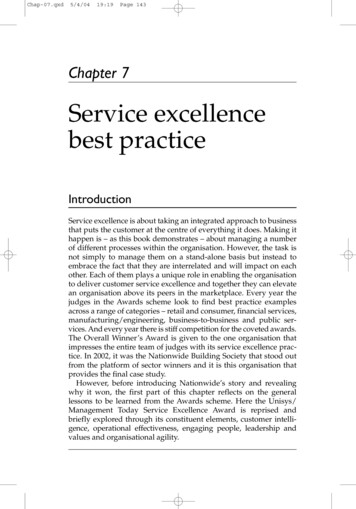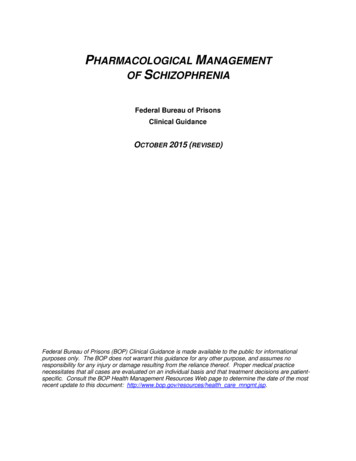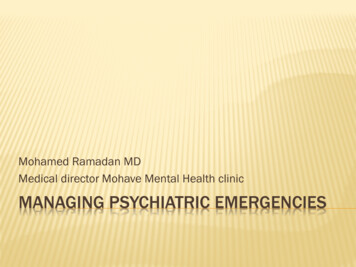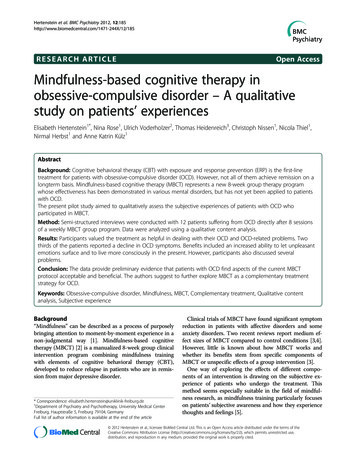
Transcription
DWP
Dealing with PsychosisA toolkit for moving forward with your lifel a s t e d i t e d J u Ly 2 012
Table of ContentsAbout This Toolkit . . . . . . . . . . . . . . . . . . . . . . . . . . . . . . . . . . . . . . . . . . . . . . . . . 3Monitoring Your Progress . . . . . . . . . . . . . . . . . . . . . . . . . . . . . . . . . . . . . . . . . . 5What Is Psychosis? . . . . . . . . . . . . . . . . . . . . . . . . . . . . . . . . . . . . . . . . . . . . . . . . 7What Can You Do About Psychosis? . . . . . . . . . . . . . . . . . . . . . . . . . . . . . . . . . 14Taking Care of Your Health . . . . . . . . . . . . . . . . . . . . . . . . . . . . . . . . . . . . . . . . 21Managing Stress . . . . . . . . . . . . . . . . . . . . . . . . . . . . . . . . . . . . . . . . . . . . . . . . . . 27Solving Problems . . . . . . . . . . . . . . . . . . . . . . . . . . . . . . . . . . . . . . . . . . . . . . . . . 31Setting Goals and Moving Forward . . . . . . . . . . . . . . . . . . . . . . . . . . . . . . . . . . 41Understanding Cognition . . . . . . . . . . . . . . . . . . . . . . . . . . . . . . . . . . . . . . . . . . 49Connecting With Other People . . . . . . . . . . . . . . . . . . . . . . . . . . . . . . . . . . . . . . 59Preventing Relapse . . . . . . . . . . . . . . . . . . . . . . . . . . . . . . . . . . . . . . . . . . . . . . . . 65Dealing With Symptoms . . . . . . . . . . . . . . . . . . . . . . . . . . . . . . . . . . . . . . . . . . . 74Congratulations . . . . . . . . . . . . . . . . . . . . . . . . . . . . . . . . . . . . . . . . . . . . . . . . . . 84For the Support Person . . . . . . . . . . . . . . . . . . . . . . . . . . . . . . . . . . . . . . . . . . . . 85Additional Worksheets . . . . . . . . . . . . . . . . . . . . . . . . . . . . . . . . . . . . . . . . . . . 105Credits . . . . . . . . . . . . . . . . . . . . . . . . . . . . . . . . . . . . . . . . . . . . . . . . . . 1132Table of Contents
About This ToolkitPsychosis can be a disruptive, confusing, and frightening experience. Hearingvoices or thinking unusual or disturbing thoughts is common in psychosis. Havingpsychosis makes it difficult to figure out what is really happening and what may bea trick of the mind. Psychosis often prevents people from doing the things they usedto do—such as going to work or school and enjoying time with friends and family.The good news is that psychosis is a treatable condition.Treatment for psychosis is provided by health professionals and involves a numberof different approaches, including medication. This toolkit is not meant to be asubstitute for the treatments provided by your health professionals. Instead, thetoolkit is to be used along with treatment by professionals.This toolkit is meant to help you learn skills you can use to:1. Manage symptoms of psychosis2. Move forward and enjoy your lifeLearning new skills is not easy. It’s important that you have somebody who cansupport you in the learning process. This is your Support Person.Think of who might best be able to help support you in learning these skills.SupportPersonYour Support Person might be a:···Health professionalFamily memberClose friendPick someone you feel comfortable with and can trust. You may choose to have a fewdifferent people support you. Some of the skills in this toolkit will be easier to learnand practice if you have more than one Support Person.3About This Toolkit
If you don’t have a Support Person, you can still use this toolkit and learn new skills.Some people who have used the toolkit alone said that they found it useful but felt itwould be even better having a Support Person available.UnderstandingA later section of this guide is specifically for the Support Person. Feel free to lookthrough the For the Support Person section on page 85 if you are curious.Using This ToolkitThere are many ways to use this toolkit.You can start in any section and workthrough the toolkit in any order.The Table of Contents shows what the toolkit covers.Some of the topics may be more useful to you than others.Pick and choose what parts you want to work on.There are many activities in this toolkit.Some of the activities are challenging.Give yourself time and be patient.Learning new skills takes time.Plan on reading and using this toolkit a little bit at a time.4About This Toolkit
MonitoringYour ProgressAt first glance, this Dealing with Psychosis toolkit can look pretty long andcomplex. It may even be intimidating. Here are some suggestions for how totrack your progress and pay attention to the effects of doing the exercises asyou work through the different sections.One simple approach is to make use of a “day planner” or calendar where hours,days, or weeks are blocked off to represent time spent working on various toolkitsections. For example, it could be your plan to work on the Setting Goals andMoving Forward section for two weeks—perhaps two times a week for 30 minuteseach time. Many people find it gratifying to look in their day planner and be ableto cross off items on their list of goals as they are completed.This toolkit has quite a few worksheets and forms to complete. You may want to fillout some of the worksheets more than once. This could occur, for example, whena new problem arises, and you want to do the problem-solving worksheet again towork on the new problem. Or, it might happen when you change or add to your listof goals.Other times, a worksheet can be used to track strategies from the toolkit as youtry them out. For example, in the Understanding Cognition section, a number ofdifferent strategies are listed in the What Can I Do? sub-sections. Writing downwhich strategies you try can help keep track of your choices.Finally, it is important to know how well a strategy is working and whether aproblem area is getting any better. One thing that can help is to create a ProgressForm like the sample on the next page. The guideline for rating your problems usesa scale of 0 to 10. A score of 0 means “no problem,” and a 10 means “this is a hugeproblem every day that has negative effects on my functioning.”5Monitoring Your Progress
In the first example below, the “Rating Before” for item one, Memory – missingappointments, is a 7. The strategy of using a day planner every day seems to beeffective, because after two weeks the same problem has gone down from a 7to a 6. After four weeks the rating has dropped another point down to a 5.RatingProgress Formareato R at er at i n gbefores t r at e g yusedr at i n g a f t e r2 weeksr at i n g a f t e r4 weeksMemory –missingappointments7Used dayplannerevery day659Deep breathing every dayfor 15 minutes78 – Stoppeddoing theexercisesafter 2 weeksSocialconnectionsRelaxingRating scale:61 No problem5 Definitely an issueMonitoring Your Progress10 Huge problem
What Is Psychosis?Psychosis is a condition that affects a person’s ability to know what is real versuswhat is not real. The experiences of hearing voices and having unusual thoughtsoften occur in psychosis.Psychosis is more common than people think. About 3% of all people experiencepsychosis at some point in their lives. Many health disorders can include psychosis:schizophrenia, bipolar disorder, severe depression, a bad reaction to surgery, andothers. You don’t need to know all about these medical diagnoses to learn how todeal more effectively with psychosis.Psychosis is not Just because a person has an unusual thought from time to time does not meanthat the person is experiencing psychosis. Having unusual thoughts is not psychosiswhen these thoughts occur but can be put out of one’s mind easily.Psychosis is Psychosis sometimes having trouble figuring out what is realSuppose your unusual thoughts won’t go away, and you get confused about what isor isn’t real. You may also start to have other strange experiences, such as hearing orseeing things that aren’t there.You may feel confused and frightened. It may become difficult to do things that youwere able to do just a while ago. A number of distressing changes can happen inpsychosis.Common symptoms of psychosis include:1. Strange and unrealistic thoughts that won’t go away even when other peoplebelieve the thoughts can’t be true.2. Hearing things or seeing things that aren’t there.7What Is Psychosis?
Your Turn!Your Turn!Write down any symptoms or problems you might have that could indicatepsychosis.Strange or unrealisticthoughts that won’tgo awayHearing or seeingthings that aren’tthereWrite Symptomsor ProblemsPeople experiencing psychosis often develop other types of problems,such as:···8Wanting to be alone all the timeFeeling sad or anxiousFeeling “high” or excitedWhat Is Psychosis?· Difficulty sleepingFinding it hard to get out and·do things· Using alcohol or drugs
Your Turn!Please check any of the boxes that apply to you.Your Turn! Wanting to be alone all the time Feeling sad or anxious Feeling “high” or excited Difficulty sleepingFinding it hard to get outand do thingsUsing alcohol or drugsMore about psychosis.There are many different reasons why a person may develop psychosis. In fact,nobody is immune from psychosis. Psychosis occurs in all sorts of people across allcultures. Almost everyone would develop psychosis by going without sleep for a longperiod of time or overusing certain drugs, such as amphetamines, for an extendedperiod.UnderstandingDeveloping psychosis has nothing at all to do with being mentally weak. You cannotsimply “will” yourself to not develop psychosis.Research shows that a number of things can influence an onset of psychosis. Thesethings can be grouped together into six factors: situation, physical state, thoughts,perceptions, emotions, and actions. These factors interact with each other. Forexample, a stressful situation affects your physical state. When your physical statechanges, your thoughts may also change.A Closer Look at the Six FactorsSituationPsychosis often begins with a situation that is stressful.Many different types of situations can cause stress, such as:9· Death of a loved oneMoving to a new country or a·new city· Changing schools· Taking on a new jobWhat Is Psychosis?· Breaking up with someoneNot having enough money to·pay the billsPeople being critical or hostile·toward you
Situation High stress Hostility and conflictUnderstandingActionsThoughts Lack of motivationfor action Disconnection fromother people Distorted thinking Exaggerated self-image Confusion ParanoiaEmotionsPerceptions Inappropriate feelings Excessive fear Flatness Difficulties “tuningout” information HallucinationsPhysicalState Disturbed brain systems Genes Sleep DrugsThe risk of developing psychosis increases when a person is faced with a stressfulsituation.This doesn’t mean that people only develop psychosis when things are not goingwell. Some people develop psychosis when everything seems fine for them.The psychosis seems to come out of nowhere. However, learning skills tomanage stress can help anybody with psychosis to recover and stay well.Physical StateMany different types of physical states can increase a person’s risk of developingpsychosis.10What Is Psychosis?
GenesSome evidence indicates that certain genes may increase the likelihood of psychosis.UnderstandingIf one of your relatives has experienced psychosis, then your risk of psychosis issomewhat increased because you share many of the same genes with your relative.However, just because a person has a family history of psychosis does not meanthat the person will automatically develop psychosis. Other factors need to bepresent for psychosis to develop.BrainThe brain is very important in psychosis. It appears that changes to certain brainsystems can increase the risk of psychosis. Many drugs cause changes in the brain,so drug use can also increase your risk of psychosis.SleepFinally, poor sleep is a problem that often occurs in psychosis. A person withpsychosis sometimes can’t sleep or sleeps too much. Problems with sleepingcan increase your risk of psychosis and make it harder to recover.ThoughtsIf you’re suffering from psychosis, you may also find it difficult to think in a realisticway about your situation. Your thinking may be distorted.This distorted thinking can take four forms:1. You just can’t make sense of your situation. Things may seem confused ormeaningless.2. Your situation seems dangerous. You may think that other people areplotting against you or planning to harm you.3. You believe that you have extra special powers or abilities, that you have anexceptionally special role in the world far beyond almost anyone.4. You may think that ordinary events have more personal meaning to youthan to other people. For example, you listen to the news on television andthink that the announcer is speaking directly to you.11Any of these kinds of distortions put you out of touch with reality, with the resultthat you can’t accurately understand what’s going on around you. This, in turn,makes it harder to deal with the situation appropriately.What Is Psychosis?
PerceptionsUnderstandingPeople with psychosis often develop problems with how they perceive reality.The world may seem different.It may be more difficult to “tune out” things such as street noise or people in acrowd. A person may become more sensitive to noise or light. Determining what isand isn’t important may become difficult. The experience may feel overwhelming.People suffering from psychosis may hear, smell, taste, feel, or see things that otherpeople do not also experience. If this happens to you, then you are experiencingwhat is called a hallucination. A common type of hallucination in psychosis is tohear voices that no one else can hear.EmotionsIf you are suffering from psychosis, you may find that you have emotional responsesthat you wouldn’t normally have—your emotions may be distorted.Emotional distortion can take three different forms:1. It is no longer easy for you to show or feel emotion. For example, you maysmile less, or you may cry less. Your emotions seem to be flat.2. You develop intense feelings of fear that don’t seem to fit with thereal situation.3. You feel extremely good or “high,” which doesn’t seem to fit with thereal situation.The type of emotion you experience will be influenced by other factors, such as yourthoughts. Being frightened makes sense when you are thinking that other peopleplan to harm you in some way—but in psychosis these thoughts and the relatedemotions don’t actually fit with the real situation.12What Is Psychosis?
ActionsD isco n n ec ting from oth e r peo pleUnderstandingIt is common in psychosis to disconnect from other people. During psychosis, youmay find it difficult to communicate with others. You may not be sure what otherpeople are thinking or feeling when you have a discussion with them. You mayfeel distant from other people and prefer to be left alone.Psychosis involves problems understanding what is and isn’t real. This lackof understanding makes it difficult to know what is happening. It may feeluncomfortable being around other people when you don’t know what is going on.However, disconnecting from people is actually an unhealthy action.Having support from other people will help you get better and stay better.L a c k o f M o t i vat i o nAnother change you might have noticed is that psychosis can make it verydifficult to do simple things that used to be easy.For example, just getting out of your house, taking a shower, or cleaning yourbedroom may seem difficult. Or, you may not care whether you participate ininteresting activities that you used to enjoy, such as going to the movies orengaging in your hobbies. Your motivation to do things just seems to be lacking.Having a lack of motivation does not mean you are lazy. It is a symptom ofpsychosis that needs treatment and requires effort to overcome.Don’t be discouraged. Remember that these problems are treatable. The nextsection shares some strategies you can use to help control psychosis.13What Is Psychosis?
What Can You DoAbout Psychosis?Health professionals will work with you to treat the psychosis. You may have justone health professional, or you may have a whole team of professionals workingwith you. The number of professionals you have working with you doesn’t matter.What does matter is that you are getting good treatment.Good treatment medication support skillsWhen you have all three parts of this treatment formula then your chances ofgetting better and staying healthy improve greatly.MedicationThere are many different kinds of medication available to treat psychosis.These medications are called antipsychotic medication. It’s not importantthat you know about all of them. It is important that you know what specificmedication(s) you are taking.Antipsychotic medication is essential in the treatment of psychosis. The medicationdoes two important things:1. Gets rid of many of the symptoms of psychosis.2. Helps to prevent psychosis from occurring again.In addition to antipsychotic medication, people who have experienced psychosismay sometimes be prescribed other medications. This depends on the symptomsthey have experienced. For example, antidepressant or mood stabilizing medicationmight be used for problems with mood. Whenever you are prescribed a medication,be sure to find out:14···How much you need to take.What symptoms the medication is meant to help.What side effects the medication might cause.What Can You Do About Psychosis?
Your Turn!Write down information about the medication you are taking.Your Turn!It’s best to complete this activity with the health professional who is·prescribing your medication.Update this table whenever there is any change to the type or dose of·your medications.MY MEDICATIONSName ofm e d i c at i o nProblems thism e d i c at i o n w i l lHelp withDose and timesto ta k e t h i sm e d i c at i o nWrite Down15What Can You Do About Psychosis?
Medication side effectsUnderstandingMedication can cause side effects. Side effects are unwanted effects ofthe medication.Some common side effects of antipsychotic medication include:···Feeling tiredWeight gainUnwanted movementsThe side effects are different for each different medication. The side effects alsovary from person to person. One person may gain weight from a medicationwhile another person taking the same medication may not.It’s important that you know the possible side effects for the medicationsyou are taking.Your Turn!Your Turn!Write down information about the side effects of the medication youare taking.It’s best to complete this activity with the health professional who is·prescribing your medication.Ask your health professional what are the mild and more common side·effects for each medication. Also, find out if there are any other, moreserious side effects that you should watch out for. Always discuss anyside effects from a medication with your health professional.You should report any side effects, even if your health professionalhas not mentioned them.16What Can You Do About Psychosis?
m y m e d i c at i o n s – P o s s i b l e s i d e e f f e c t sWrite DownName ofm e d i c at i o npossibleside effectsmy sideeffectsMore About MedicationUnderstandingAlthough antipsychotic medications are helpful in treating psychosis, too oftenpeople stop taking them.There are four common reasons why people stop taking medication:1. Side effects2. Feeling better3. Forgetting4. Stigma17What Can You Do About Psychosis?
1. Side EffectsUnderstandingSometimes people stop taking their medication due to side effects. There are waysto decrease the side effects while continuing to take your medication.Sometimes this involves medication changes such as: lowering the dose, changingthe time of day the medication is taken, or switching to another medication.Other times this may involve changes to your behaviour. For example, if you have adry mouth you could drink more water or chew gum. If you gain weight, you couldmodify your diet and exercise more.It is important to discuss any side effects with your health professional.He or she can help you find ways of dealing with your side effects.2. Feeling BetterPeople might also consider stopping their medication because they feel better.While it’s great that you are feeling so much better, you should not stop takingyour medication without consulting your health professional.Remember that antipsychotic medication helps prevent the psychosis fromcoming back. It is recommended that you continue taking antipsychoticmedication even after most of the symptoms of psychosis are gone. This maymean for another few months, or sometimes for many years.3. ForgettingSometimes people simply forget to take their medication. Always keeping yourmedication in the same place next to something you use every day might help.For example, keeping your medication right next to your toothbrush, or using apillbox divided by the days of the week can be effective reminders.4. StigmaTaking the medication is a reminder that you have experienced psychosis.Many people feel depressed or ashamed that they have had psychosis.They may stop taking the medication as a way to convince themselvesthat everything is normal again. If you want to decrease or go off yourmedications, discuss it with your doctor.18What Can You Do About Psychosis?
Your Turn!In the first column write down the ways your medication has helped you.Your Turn!In the second column write down the things that you don’t like aboutyour medication.h o w ta k i n g m e d i c at i o nhas helped methings I don’t likea b o u t m y m e d i c at i o nWrite DownAfter you’ve completed the activity, talk to your health professional, especially aboutanything you don’t like about your medication(s). He or she may be able to help withyour concerns.19What Can You Do About Psychosis?
SkillsLearning new skills to lower your level of stress and help you cope with symptomscan help you manage psychosis.UnderstandingIn the following sections you will learn about these important skills:········Taking Care of Your Health (page 21)Managing Stress (page 27)Solving Problems (page 31)Setting Goals and Moving Forward (page 41)Understanding Cognition (page 49)Connecting With Other People (page 59)Preventing Relapse (page 65)Dealing With Symptoms (page 74)Work on these skills one at a time. You might not complete an entire section in onesession, or even in one day.Remember that you don’t have to learn all these skills on your own. Your SupportPerson, whether a health professional, family member or close friend, is there tohelp you.SupportAn important part of your treatment is feeling that you are being supported in yourrecovery.People who can support you may include your:···Health professionalFamilyFriendsInvolving your family in appointments with your health professional can helpincrease the support you feel from them. It also helps your family understandwhat you are going through.20Some people with psychosis find that they have become isolated, feel lonely anddon’t have enough connections with people. They are unable to get the supportthey need. If this has happened to you, then you should check out the sectionon Connecting With Other People in this toolkit.What Can You Do About Psychosis?
Taking Careof Your HealthTaking good care of your health helps keep you in good shape both physicallyand mentally.In addition to getting regular physical and dental check-ups there are a numberof other things you can do to take care of your health.···Sleep wellEat well and exercise regularlyReduce your use of drugs and alcoholThe following tips do not cover all of the possible information about eachof these topics. Please talk with your health professional if you are havingsignificant problems in any of these areas.Sleep WellSleeping well every night will help you feel better during the day and make iteasier to deal with stress.Here are some tips on how to improve your sleep.·Set a schedule. Follow a regular time to go to bed and wake up sevendays a week.view over-stimulating videos on the Internet.· Avoid caffeine after dinner. This includes coffee, cola, and tea.Avoid alcohol and nicotine before bedtime. These substances can cause·restless sleep.Do something to unwind before going to bed. You could do a relaxation·exercise, read a book, or take a hot bath. Do not play computer games or·21Associate the bed with sleep. Avoid using the bed as a place for reading,watching TV, eating, or working.Taking Care of Your Health
·UnderstandingDon’t stay in bed when wide awake. If sleep does not occur after thirtyminutes, get out of bed and engage in a quiet activity such as reading untilyou are sleepy. Do not watch TV or play computer games.Avoid taking naps during the day. Some people can take short naps in themiddle of the day without a problem. However, for most people naps duringthe day interfere with sleep at night.Pay attention to the comfort of your bedroom. Keep your bedroom dark,quiet, and at a comfortable temperature. Make sure your mattress andpillows are comfortable.Avoid heavy exercise after dinner. Gentle exercise after dinner, such as aleisurely stroll, may help with sleep. Avoid heavy exercise after dinner, as thismay delay sleep. Vigorous exercise, when performed earlier in the day, canhelp with sleep at night.····Do not use sleeping pills on a regular basis. Sleeping pills are only helpfulfor short-term treatment of sleep problems. Longer-term use can lead toproblems with dependence and further sleep problems when the medicationis stopped.Eat Well and Exercise RegularlyPeople with psychosis may gain weight because they decrease their activity level.Weight gain is also a side effect of some antipsychotic medication. Eating well andgetting regular exercise will help you stay in good physical shape and maintaina healthy weight. It will also give you more energy and allow you to deal with stressmore effectively.Here are some hints on how to eat well.·Don’t go on a strict diet to lose weight. Almost all people who follow strictdiets gain the weight back (and sometimes gain even more weight afterdieting). It’s best to watch what you eat and make sure you’re making goodfood choices on an ongoing basis.Eat a balanced diet. Diets that emphasize eating a lot of just one type offood are not healthy. You need to have a mix of grains, vegetables, fruits,dairy, and protein every day.·22··Keep your home stocked with healthy foods. Shop for healthy food choicesthat are easy to prepare.Choose snacks wisely. If you need a snack, then reach for a piece of fruit orsome cut-up veggies instead of a bag of potato chips or a chocolate bar.Taking Care of Your Health
Here are some hints on how to get regular exercise.·UnderstandingChoose activities you enjoy for exercise. Choosing an enjoyable activityhelps ensure that you will keep doing it. You may enjoy playing sports, goingto the gym, or taking up a new activity such as swimming, cycling,or hiking.····Exercise with a friend. This makes exercise more fun and can help motivateyou on those days you don’t feel like exercising.Be more active during the day. Take the stairs instead of the elevator.Walk the long way to the store.Listen to music. Music can make you feel like moving. If you listen to musicwhile you exercise, you may exercise for a longer time and enjoy it more.Start slowly. You won’t become a marathon runner overnight. Start with justfive minutes a day and increase the duration slowly over time.There is a lot of inaccurate and even harmful information about eating and exerciseon the Internet and in many magazines. It is best to get any further information onthese topics from your health professional.Use the Setting Goals and Moving Forward section on page 41to help you reach your goals to eat well and exercise regularly.Reduce Your Use of Drugs and AlcoholThe use of recreational drugs and the excessive use of alcohol are risky for a personwith psychosis. These substances slow recovery and increase the risk of psychosiscoming back.People who use drugs and alcohol usually do so because they experience pleasureor other positive effects. Some of the positive effects people report from using drugsand alcohol are:23······Feeling “high”Feelings of relaxationAvoiding boredomExperiencing a “thrill”Escaping from negative feelings such as stress or depressionFeeling less shy or awkward around others.Taking Care of Your Health
But most people also experience negative effects, such as:Understanding······Unpredictable effects that can lead to panic, paranoia or depressionRisks to physical and mental healthArguing with family and other loved onesDependency or addictionProblems concentratingProblems at work or schoolThe decision to reduce or quit using drugs and alcohol is yours. Nobody can forceyou to quit. It is best if your decision to quit or continue is an informed decision.Your Turn!List the positive and negative effects of your own drug or alcohol use.positive effectsN e g at i v e e f f e c t sYour Turn!Write DownTake a look at your list. Do you see any advantages to reducing your drug andalcohol use?24Taking Care of Your Health
Reducing Drug or Alcohol UseUnderstandingIf you decide that there are advantages to reducing your use, then you are going toneed skills to be able to accomplish your goal. Reducing drug use requires goodgoal-setting and problem-solving skills. These skills are covered in the SolvingProblems and Setting Goals and Moving Forward sections in this toolkit.A trigger is a situation or event that can be a factor that contributes to misusingdrugs or alcohol. You can find out more about triggers beginning on page 67in the 1. Controlling Triggers For Psychosis section.As you start to reduce your use, you should be prepared to deal with triggersthat may come up.Here is a sample list of triggers and ideas on how to handle them.25triggerhow I’ll handle itI’m with friends or at a party. Everyone isdrinking alcohol or tak
Monitoring Your Progress At first glance, this Dealing with Psychosis toolkit can look pretty long and complex. It may even be intimidating. Here are some suggestions for how to track your progress a










